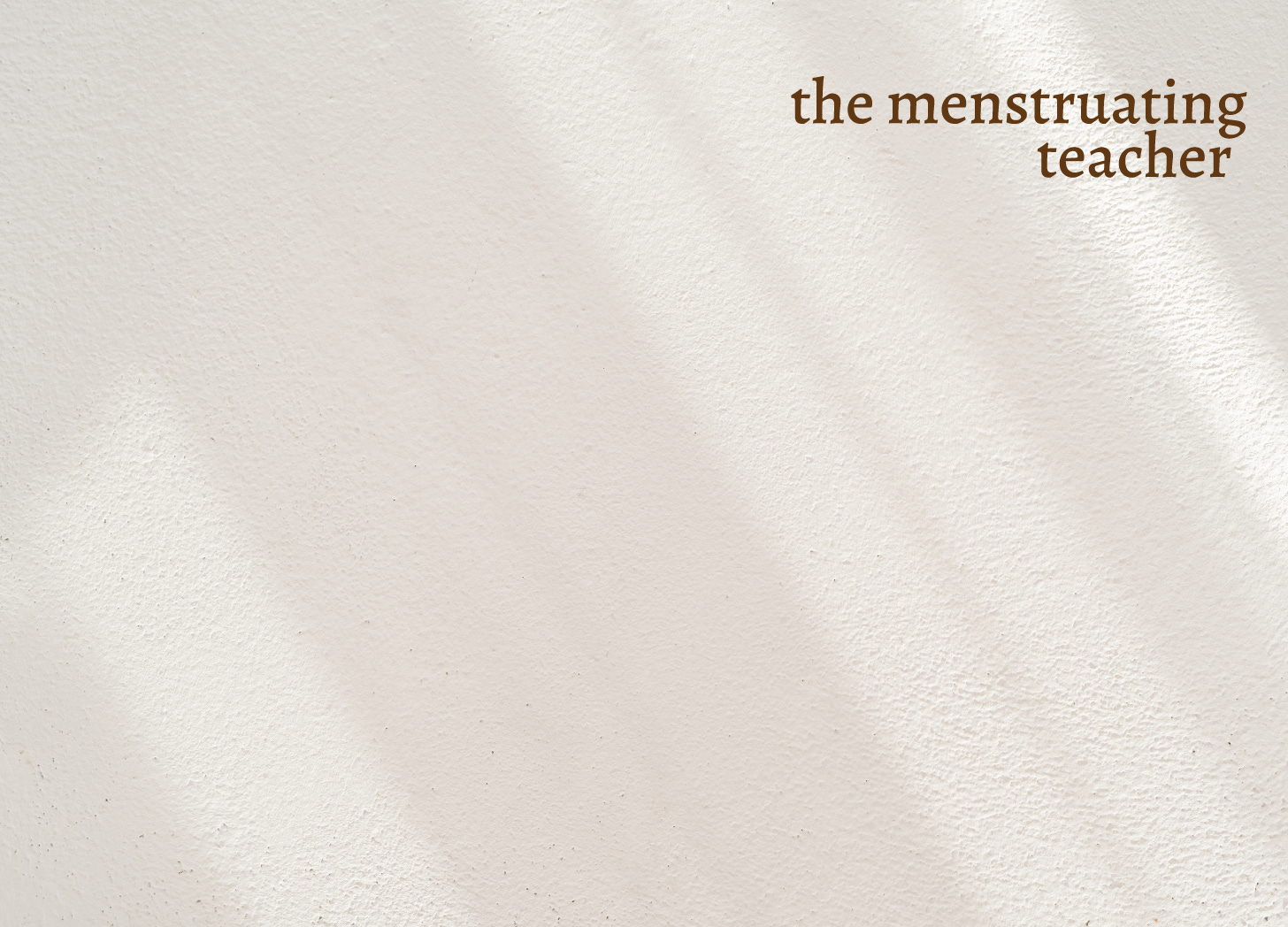The Menstruating Teacher
Layer up! You're teaching today. And you might not get a break. But? You should still greet students at the door.
I teach high school, and the following post will reflect that situation, not that of a middle school or elementary teacher. Those experiences may vary.
You know what else will vary? Our menstruating experiences.
The expectations.
Teachers are not supposed to use the students’ restrooms, and for good reason.
Yet, I have never worked in a building where there were adequate restrooms for faculty. If the break is five minutes, and teachers have an inordinate amount of tasks between classes, walking to the office or break room might not be possible.
Additionally, classes are not to be left alone, again, for good reason—which means teachers cannot be late to class. A fire could start, students could fight, or someone could have a medical emergency.
If teachers are to be with students, they cannot be changing their feminine products.
If you have ever menstruated, you know the subsequent problems.
Students entering the classroom and research.
Even if teachers had time to change during the switch of classes, even if they could be tardy to class, teachers are still supposed to be interacting with students.
Research and expectations regarding the time between bells is well-established.
Greet students at the beginning of class and say something positive to them.
Encourage a responsive classroom by welcoming each student.
While it is true that teachers can greet students after they are all seated, the stress is on a Positive Greetings at the Door (PGD) strategy. While I would also agree that greeting students at the door is worthwhile, the time permitted for teachers to be humans and take care of their bodily functions simply will not fit into the current bell-to-bell race because a class period leaves little time for teachers to reset.
Additionally, some schools require teachers to stand in the hall between passing periods, not allowing time to change:
I have seen some schools make an agreement with all the teachers that they will stand in the hallways to greet students before each class. It completely changes the school’s atmosphere, tamps down on misbehavior in corridors, and all the while improves learning in classrooms.
In fact, the benefits of using student names extends into other areas of concern:
In a classroom setting, personal greetings play an important role in creating a positive learning climate. . . Particularly for transgender and gender non-conforming students, the recognition of their preferred social name is a key element in expressing support and acceptance of who they are.
Finally, researchers are casual, using terms like “simple” and “merely” to explain why teachers should greet students at the door, terms that ignore the humanness of teachers:
The current research suggests one quick, simple antecedent intervention that can increase student on-task behavior during the first 10 min of class. Merely greeting a student at the door with his or her name and a brief, genuine pleasantry increased student on-task behavior.
I could find endless research for greeting students at the door, but the point is that students perform better, pay better attention, and feel connected when their teacher greets them at the door.
Students entering the classroom and the teacher being a human with a period.
Overall, I aim to greet my students because the research aligns with what I witness in my classrooms. Students do appreciate the one-on-one time with a teacher. I get to hear funny and neat tidbits from their lives. Sometimes they show me pictures of their pets or ask me questions they’d rather not ask in front of their peers.
For twenty years, I have missed various weeks of each month because of my period.
The research about greeting students neglects the needs of menstruating teachers. I’d add that research ignores the needs of pregnant and pumping teachers as well.
The concern.
Two situations are true here.
Students benefit when teachers greet them at the door.
The majority of teachers in the US are female.
About three-quarters (77%) of teachers are women and 23% are men, according to data from the National Center for Education Statistics (NCES) for the 2020-21 school year, which is the most recent one available.
With overwhelming evidence to the benefits of teachers greeting their students, and the majority of teachers needing a break for the restroom, the time teachers have to take care of themselves and greet students is not feasible.
(Note: Menstruating or not, humans need to use the restroom. Teacher bladder is a real issue.)
The truth.
Women who menstruate struggle to make it through the work day when their job involves the safety, monitoring, and guidance of minors. The need for changing hygienic supplies cannot be scheduled into the day for many reasons, and the time and accessibility restraints then prevents teachers from implementing best practices.
At least once a month, women who menstruate are likely in pain, yes. They are also worried about bleeding in front of students or experiencing TSS. They might be wearing a tampon that needs changed and is uncomfortably sliding out. Pads might be uncomfortable because they are full.
Teaching is unpredictable, and so are periods. The US school system does not treat teachers like humans with bodily needs who need normal accommodations.
Like too many aspects of the school day, the expectation is that teachers will find a way, that they will suffer in silence. Research shows what actions will benefits students; teachers are left either to take care of personal needs or not implement research.
Access to restrooms and break time is an issue that is well-documented, yet the humanness of teachers remains ignored.
A Class Period from a Teacher's Perspective
This post is part of the series, What Teachers Do—Naming It. The elusive “it” of teaching needs to be outlined, laid bare, because the expectations for teachers is purposefully unsustainable.




Amongst other things... LOL... My male supervisors KNEW when I wore BLACK and was quiet, it's that time. Tread lightly. I needed GRACE for 2-3 days. They also had wives, daughters and sisters who helped them to understand!! Thanks for sharing.
My school changed to 10 minute passing periods and it had made such a huge difference for me. Just knowing I can run downstairs to pick up copies (we thankfully don’t have to make our own) or use the bathroom is so much better than it was when we only had 5.